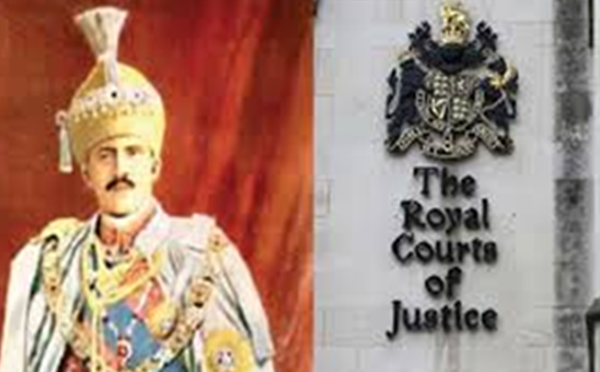THE HYDERABAD FUND
Posted on : December 9, 2019Author : AGA Admin

The UK High Court granted Mukarram Jah, the titular Nizam of Hyderabad, the ownership of a fund which has been in dispute for over 70 years and now amounts to £35 million.The verdict came in June 2019 when the court accepted the claim of the Nizam to the fund. The court ruled against Pakistan, setting aside the argument that the funds were for purchase of arms or that the funds had been absolutely and irrevocably transferred to Pakistan. The judgment covered a complex historical and legal set of issues, interpreting facts and events that occurred 70 years ago to establish that the fundswere always held in trust for the Nizam.
The dispute started in 1948, in the days leading up to India’s Independence,When the Nizam of Hyderabad Osman Ali, one of the richest princes in India, refused to join the Indian Union it was annexed by India in 1948 in a military operation. The Nizam hired the services of Sir Walter Monckton, who negotiated a “Standstill Agreement” between the Government of India and the Nizam.At the time of agreement, the fund, which was subsequently disputed, was parked in two accounts in London.The money in the Imperial Bank of India was transferred to a Hyderabad Government account controlled by the Nizam’s envoy and Foreign Minister Nawaz Jung.
In 1949, Nawaz Jung called on the then Pakistan High Commissioner Habib Ibrahim Rahimtoola with a request to transfer it to the Pakistan High Commissioner’s London account “for safekeeping”.Since, he accepted the request the money was transferred to the Westminster Bank (now NatWest Bank) account of Habib Ibrahim Rahimtoola who agreed “to keep the amount in trust”. Immediately after the merger of Hyderabad with India, the Nizam asked the bank concerned to reverse the transaction since it was carried out without his authorization. The bank refused and the money in the frozen account came to be popularly known as the Hyderabad Fund.
The Nizam thereafter went to court in 1954 against Pakistan and the bank. Pakistan claimed sovereign immunity from any legal proceedings in the UK. Pakistan’s claim of sovereign immunity was upheld by the British House of Lords and this froze, so to say, all proceedings for the next almost six decades. The money remained in the account, growing with accumulation of interest to the present level of £35 million. The government of India formally became a claimant in 1965 after the Nizam assigned to it and to his heirs his claims on the fund. This was in effect only a legal change, since Pakistan’s immunity in British courts meant that legal proceedings were not available as an option to settle the case.
The position changed in 2013 when Pakistan instituted a case against the bank for releasing to it the funds in the account, in effect also withdrawing from its position of sovereign immunity. The change was a fundamental one — hitherto Pakistan had been in the position of resisting or denying the Nizam’s and, later, India’s claim and it had done so on the procedural ground of its immunity from British law. By now claiming the funds for itself, it created a situation where the ownership of the money could be decided in a court of law. India and the Nizam’s heirs accordingly became a party to this case by claiming ownership for themselves jointly.
The claim to the Hyderabad Fund was made by the grandson of the Seventh Nizam, Turkey-based Mukkaram Jah and his younger brother Muffakham Jah, who claimed that the fund has been gifted to them in a trust set up by their grandfather in 1963. On the other hand the Pakistan government claimed that “it was a payment made by erstwhile princely state to Pakistan for arming Hyderabad when it was about to be invaded by India” provoking a debate about Pakistan’s open acceptance of transfer of arms to India.
As numerous claimants ready themselves to battle for the Hyderabad Fund, Pakistan vows to appeal the judgement and a second victory is claimed for India (the previous being in the ICJ where the execution of Kulbhushan Jadav the former Indian Naval officer was stayed) the decades long battle over the fund, often fought in the side lines of a complex relationship where periodsof accommodation are limited, revealed widely divergent readings of the history of the events around the accession of Hyderabad to India. It also revealed the complexities of a bilateral relationship burdened by a plethora ofincidents which defy resolution.
Somya Kumari
Intern, AGA





Leave a Reply